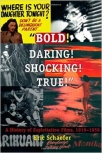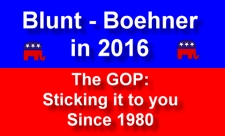One of the popular Religious Right arguments against the separation of church and state goes something like this: The Founding Fathers were all Christians, so therefore the United States was founded on Christian principles.
This is a classic error, a logical fallacy known as post hoc ergo propter hoc ("after this, therefore because of this"). But those morons are good at that. They can point to the 1960s-era Supreme Court decisions about prayer in school, claiming (erroneously) that the court kicked god out of the classroom, and that following those decisions, American society went to hell in a handbasket. You can pick out any supreme court ruling and say that the country immediately went to hell because of it. Try Brown vs. Board of Education, for example, which, as everyone knows, was a 9-0 decision on school desegregation. Unless you're a Strom Thurmond cheerleader like Trent Lott, no one rational person tries to make the case that school integration caused, say, the US intervention in SE Asia and its consequent rending of the fabric of society.
The genius of the framers of the Constitution is that they were able to construct a completely secular document in spite of their religious beliefs, not because of them.
But good luck on convincing any of those mouthbreathing knuckledraggers over on the Fundo-Xian end of the scale. By definition they are not rational people.
Thursday, February 21, 2008
The Founding Fathers Were Christian, So...
Posted by Farnsworth68 at 11:15 AM











14 Comments:
But Farns, if you looked at the founding fathers and the brand of religion they practiced and their beliefs, wouldn't you consider them mouthbreathing knuckledraggers over on the Fundo-Xian end of the scale?
And have a look at this... Constitution of Pennsylvania (1776)
Their Constitution stated in Frame of Government, Section 10: "And each member [of the legislature], before he takes his seat, shall make and subscribe the following declaration, viz: 'I do believe in one God, the Creator and Governour of the universe, the rewarder of the good and punisher of the wicked, and I do acknowledge the Scripture of the Old and New Testament to be given by Divine Inspiration.'"
Why do you even bother letting this moron post on your blog? He's an idiot who doesn't even know what he's talking about.
What do you mean Anon? Are you saying that most of the founding fathers weren't super religious to the point of being considered fundamentalists (by todays standards) or that the Constitution of Pennsylvania (1776)doesn't really say that?
Anon -- Yeah, he's an idiot, but he's kind of my pet idiot. I just ignore him. The way I figure it, if he's yapping his empty head off over here, he's leaving someone else alone.
I have a thick skin, so I can take it. I'm just not going to reply to his fatuous inane complete-fantasyland rantings. I tried that and it didn't work. It didn't contribute to a rational give and take of ideas. He just came up with one stupid ridiculous counter-argument after another which did nothing to refute -- in fact, most times completely ignored -- the point of the original discussion. Like here.
If he goes too far overboard and starts insulting my regular readers again, I'll consider putting a block on him, but for now he can whine and complain and try to needle me all he wants. It will fall on deaf ears. He'll eventually give up and go to more fertile ground to scatter the Onan seed of his egregious imbecility.
Nah Farns, I have to much fun providing facts that you can't refute... Like this one...
Congress shall make no law respecting an establishment of religion
An establishment of religion is recognition by law (hence the reference to Congress) of a religion as the official religion of a nation. Congress cannot make a law officially recognizing Christianity, Islam, Hinduism, Buddhism, atheism or any other “ism” as the official religion of the United States. Once again, this is a limitation on law-making; not a limitation on expression.
So Farns, putting "in God we Trust" on money isn't making Christianity the official religion of the U.S. any more than George Washington making Thanksgiving a religious holiday does.
Note to Anon: See what I mean?
Prove me wrong Farns... oh wait, you can't. That would mean using facts and logic.
RE: Once again, this is a limitation on law-making; not a limitation on expression.
The first amendment is a limitation on both the Congress, which cannot make such a law, and on the executive branch, which cannot behave as if such a law exists.
The executive branch is constrained to act according to, and in respect of, the law. Especially the fundamental law of the land. So any restriction on what sort of law may exist is a restriction on what sort of policy may be implemented, and what sort of actions may be taken by administrators.
Take another first amendment right, freedom of speech. “Congress shall make no law… abridging the freedom of speech”. The executive cannot do what the Congress cannot legislate. If the police show up at an anti-war rally and start photographing the participants, writing down license plate numbers, etc., they would be acting as if such a law existed, and their policy would in effect restrict and diminish freedom of speech. A private citizen could do such things, because he is not a representative of the government and has no administrative or enforcement powers. But the police cannot. When they do, people not only get upset, but take legal action against them, and the courts uphold their rights.
Farns, Thanks for posting on the AU site! Your post, and this article, are right on point! Endless discussions trying to elucidate the nuances of the founder's relgious beliefs are just not relevent to the debate. The founders did, and did intend to, set up a secular government, and, given their historical context, made that quite explicit.
Then there's the fact that most of them were Deist, not Christian at all...
Alan,
“Congress shall make no law… abridging the freedom of speech”...If the police show up at an anti-war rally and start photographing the participants, writing down license plate numbers, etc., they would be acting as if such a law existed, and their policy would in effect restrict and diminish freedom of speech.
If that is the case, how do governments get away with requiring permits to hold rallies?
Alan, you said:
The first amendment is a limitation on both the Congress, which cannot make such a law, and on the executive branch, which cannot behave as if such a law exists.
The executive branch is constrained to act according to, and in respect of, the law. Especially the fundamental law of the land. So any restriction on what sort of law may exist is a restriction on what sort of policy may be implemented, and what sort of actions may be taken by administrators.
So, why doesn't that apply to the second Ammendment ...the right of the people to keep and bear Arms, shall not be infringed.
I see a whole lot of infringing going on.
RE: If that is the case, how do governments get away with requiring permits to hold rallies?
The government does not always get away with requiring permits for rallies - or with restricting protesters at rallies to "free speech" areas. The most publicized instance that I can recall was the attempts by the city of Skokie, IL to limit the free-speech rights of the KKK through their "parade permit" policies. This practice is always being litigated.
RE: So, why doesn't that apply to the second Amendment ...
The second amendment has never been incorporated into the 14th by the supreme court. But that may (or may not) change real soon. The supreme court heard constitutional challenges to Washington DC's extreme restrictions on handgun ownership. It could go in favor of civil liberties and widen second amendment rights, then again it may not. Stay tuned...
RE: I see a whole lot of infringing going on.
So do I. That is why I'm a member of Americans United, the American Civil Liberties Union, the National Association for the Repeal of Abortion Laws, and the National Rifle Association. Join or Die.
Dont' believe the Founders intended to create a secular nation? See Treat of Tripoli http://www.earlyamerica.com/review/summer97/secular.html
Advoc8
Post a Comment